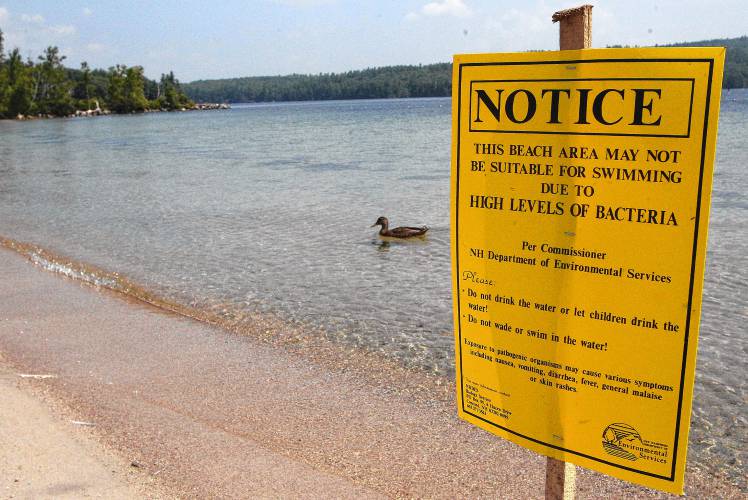A budget freeze and pandemic-related difficulties mean the state won’t be monitoring water conditions at lake beaches this summer looking for harmful algae blooms, but will only monitor ocean beaches.
“New Hampshire Department of Environmental Services has a hiring freeze and we were in the middle of hiring a new beach program coordinator. NHDES watershed management bureau usually has at least 15 interns and can only have about 4 or 5 this summer. Since the Federal BEACH Act is a priority to the coastal beaches, we are focusing on that,” wrote Amanda McQuaid of the state’s Harmful Algal and Cyanobacterial Bloom Program. “We also anticipate a lot of beach goers starting June 1 when the stay-at-home orders will allow swimming at coastal beaches again.”
The state has monitored beaches at lakes, ponds and rivers as well as the ocean since 2003 with funding from the BEACH Act, analyzing samples at both the state public health laboratory and the Limnology Center, both in Concord. These examined factors important to wildlife such as turbidity and phosphorus, and also the presence of bacteria or other organisms that could be harmful to swimmers, most obviously blooms of cyanobacteria caused by pollution, high temperatures and droppings from waterfowel.
Through 2018 samples were collected at some 170 freshwater beaches at least once a month; the agency cut back last year to about 80 higher-risk public beaches that were tested more frequently.
McQuaid said this summer the agency will monitor and collect samples only at 16 coastal beaches, some of them as often as twice a week.
“We are encouraging towns to sample their own freshwater beaches. We will also be available to respond to cyanobacteria bloom issues or any complaints related to beaches. We just cannot get to all of the beaches this summer for routine testing,” she said.
A number of volunteer organizations help monitor New Hampshire waters, including the Lay Lakes Monitoring Program run by UNH Extension Service and river sampling done by several groups, including the Upper Merrimack River Local Advisory Committee in the Concord region.
The need for social distancing explains the cutback in interns, McQuaid said: “It was more of logistics of how may people would be in proximity to each other – our lab gets really, really tight.”
For more information, check the state’s Beach Inspection Program website: www.des.nh.gov/organization/divisions/water/wmb/beaches/index.htm


 Return to the Concord Monitor
Return to the Concord Monitor